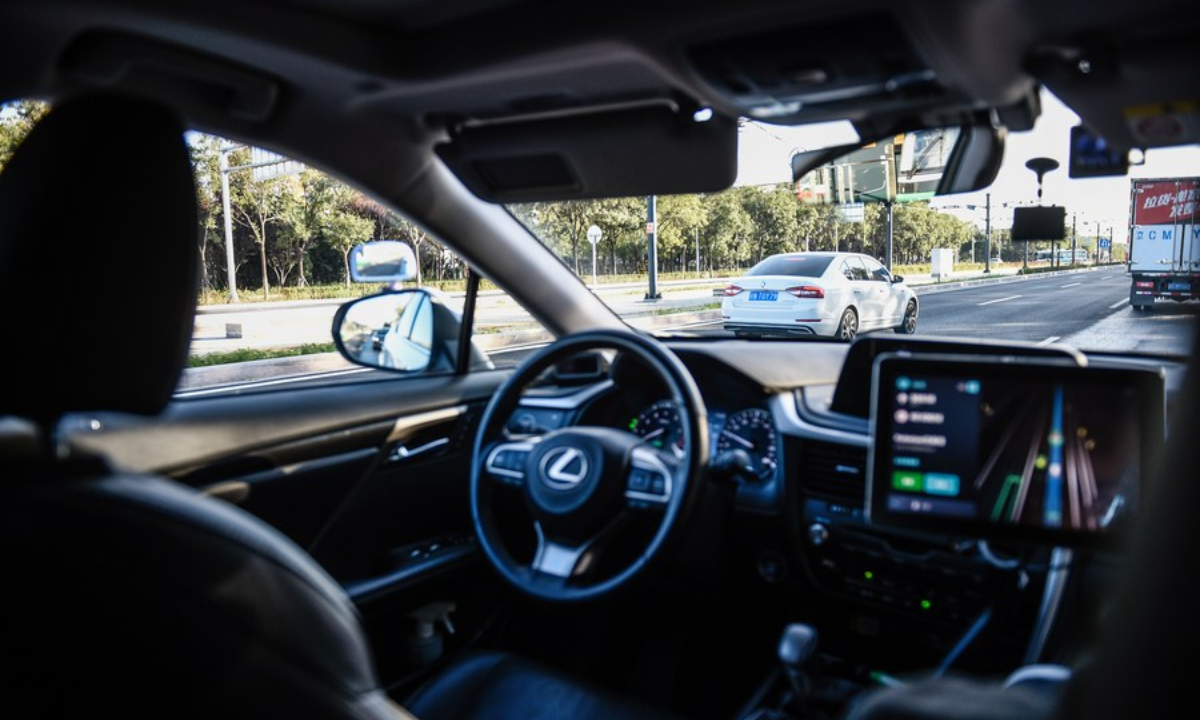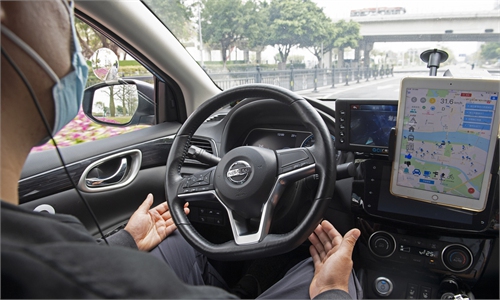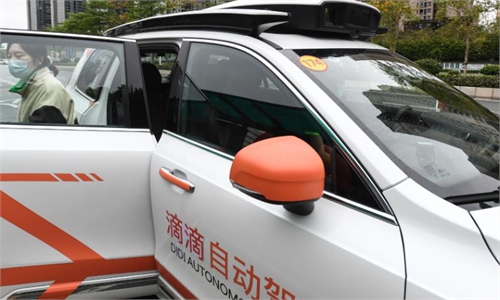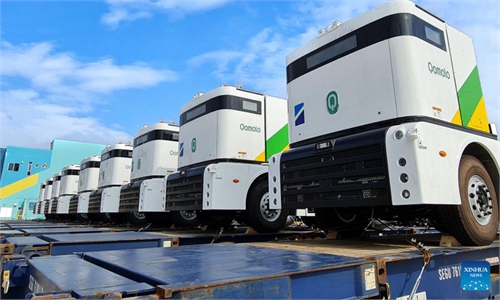US officials use autonomous vehicles as another excuse to suppress China, tech containment to hurt US firms instead

An autonomous vehicle is in driverless test on a road in Yizhuang of Beijing, capital of China, Oct 19, 2021. Photo:Xinhua
US officials are targeting autonomous vehicle companies as another flag to show their attempt to contain China's technological rise, citing so-called "national security concerns," making the list of Chinese companies targeted under the tech campaign even longer.
The attempt came after a Congressional panel probed US firms' investments in Chinese artificial intelligence and semiconductor companies, showing that the US is hysterically and unscrupulously suppressing all cutting-edge technology fields in which Chinese companies are active, Chinese experts said, adding that so-called national security is an "excuse" and it is US companies' own interests that will be hurt instead.
US Transportation Secretary Pete Buttigieg said on Thursday that his agency has national security concerns about Chinese autonomous vehicle companies in the American market, after some lawmakers called for restrictions on their operations, Reuters reported.
"Whether we are talking about hardware or software, in the same way there are concerns around telecom or TikTok, there are concerns around transportation technologies," Buttigieg said in an interview with Reuters.
Also, US lawmakers will look to jumpstart long-stalled legislation on the safe and regulated adoption of self-driving cars at a congressional hearing on July 26. Legislation in Congress has been stalled for more than five years over how to amend regulations to encompass self-driving cars, including the scope of consumer and legal protections.
China's autonomous driving technology has developed rapidly, and it has gone on a different technical route from that of the US, and even surpassed US companies in some fields, triggering jealousy and anxiety from some American politicians, Zhang Xiang, visiting professor with the Engineering Department of Huanghe Science and Technology University, told the Global Times on Friday.
Zhang believes it shows their concerns over the rapid development of China's autonomous driving technology, and the main purpose is to limit the road testing and research and development of Chinese companies in the US, and even eventually force these companies to withdraw from the US.
In other words, the US will spare no effort to suppress any cutting-edge technological fields such as capital, talent, market and technology in which Chinese companies are active, Zhang Xiaorong, director of the Beijing-based Cutting-Edge Technology Research Institute, told the Global Times on Friday.
The comments from the US Transportation Secretary came after a slew of visits from US officials, including climate envoy John Kerry, who wrapped up a four-day visit on Wednesday for discussions on climate issues with China.
It is the third time in a month that a high-level US official has traveled to China for talks, following Treasury Secretary Janet Yellen and Secretary of State Antony Blinken.
The slew of visits sends a positive signal that China and the US are keeping sound momentum of high-level communication, Chinese analysts said, but it does not mean China-US economic and trade cooperation is stable, as the major impediment is the US' persistent blockade of and "decoupling" from China in high technologies, the experts said.
A US House of Representatives committee has launched an investigation into investments by four US venture capital firms in Chinese artificial intelligence and semiconductor companies, Reuters reported on Wednesday.
The Biden administration is considering new rules that would restrict the flow of US investments in Chinese companies working on advanced semiconductors, artificial intelligence and quantum computing.
These actions taken by the US government and Congress are not based on any national security considerations, but are all excuses, Gao Lingyun, an expert at the Chinese Academy of Social Sciences in Beijing, told the Global Times on Friday, adding that they are more of an action to contain and suppress China's normal development on the grounds of security.
That crackdown will hurt the US investors or companies' interests, as those actions go against the market economy and are doomed to fail, Gao added.
Executives of leading US chipmakers, including Intel, Qualcomm and Nvidia, met Biden administration officials on Monday, urging a halt to more chip export restrictions targeting China, Reuters reported, citing people familiar with the matter.
"We urge the [Biden] administration to refrain from further restrictions until it engages more extensively with industry and experts to assess the impact of current and potential restrictions," the US-based Semiconductor Industry Association said on Monday.
Xie Feng, Chinese Ambassador to the US, said at the Aspen Security Forum on Wednesday that China opposes waging a trade war or technological war under the pretext of competition. China never shies away from competition, but the "competition" defined by the US is unfair.
We oppose both an iron curtain and a silicon curtain, Xie added, and we are the last to want a tit-for-tat cycle. So far, over 1,300 Chinese entities and individuals have been put on US sanction lists. As a result, many Chinese workers have been forced out of jobs, and their families have suffered greatly. The Chinese people will not remain silent, and the Chinese government will not sit idly by, he said.



